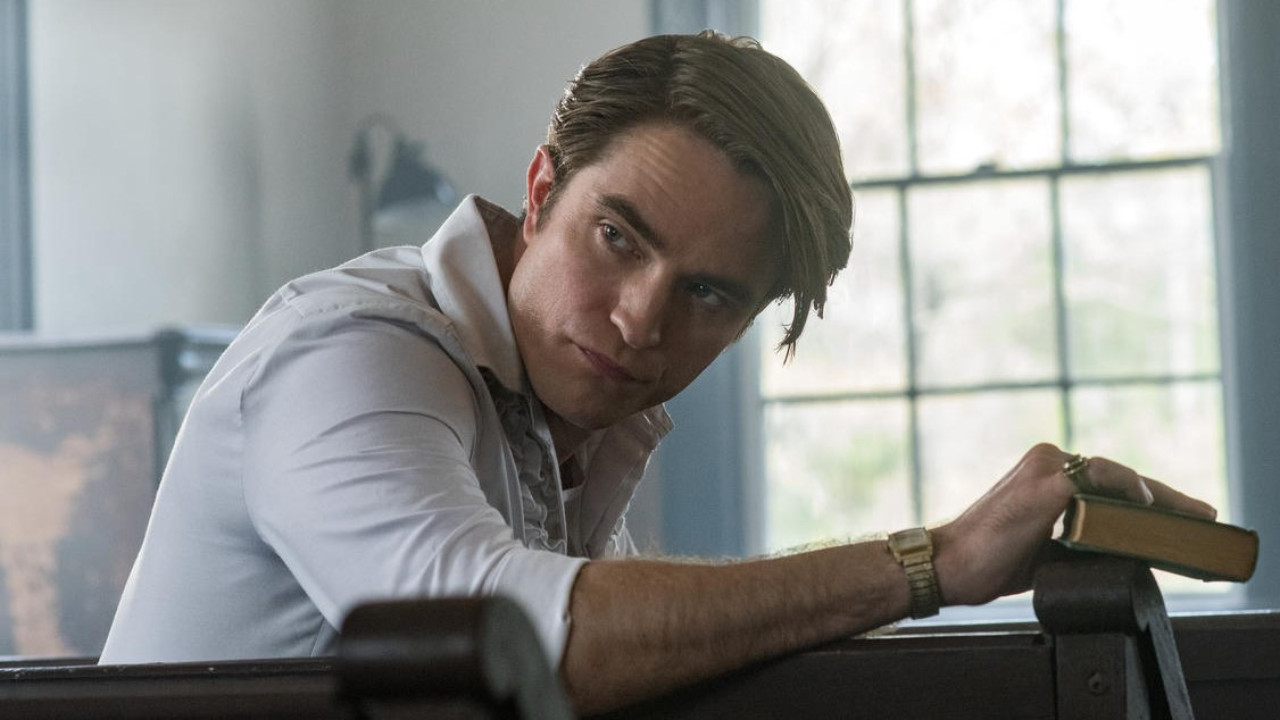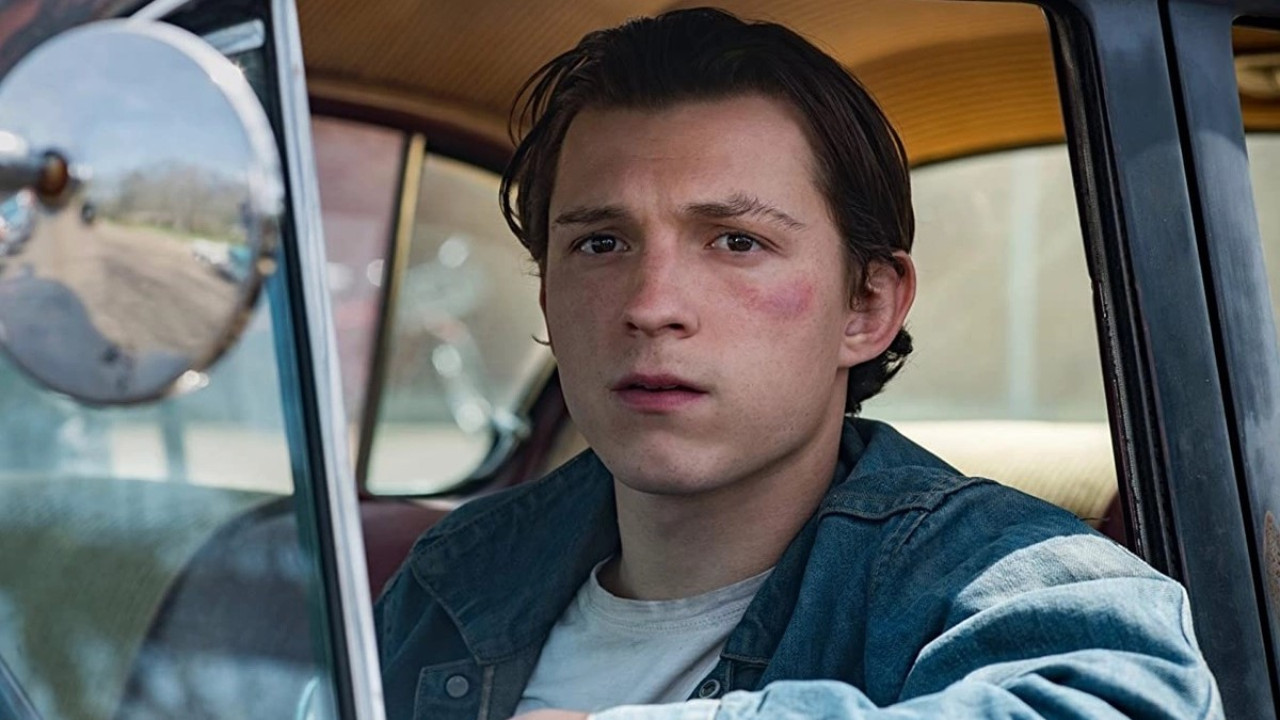The Devil All The Time director talks Robert Pattinson, filming with real spiders, and capturing the book’s spirit
Antonio Campos speaks with GamesRadar+ about directing Netflix’s new movie The Devil All The Time

The Devil All The Time comes burdened with a fair bit of expectation. Not only has director Antonio Campos adapted Don Ray Pollock’s sprawling Americana novel about the power of religion and a generation lost in war (complete with Tarantino-esque drifters, lustful preachers, and twisting timelines), but the Netflix movie also has a packed cast featuring Tom Holland, Robert Pattinson, and Bill Skarsgård, to name a few.
So, what are the challenges of juggling all those elements, cutting down the source material, directing the future Batman, and using real spiders? We sat down with Campos – whose previous work includes Grand Jury nominee Simon Killer and the Christine Chubbuck biopic Christine – to talk all things The Devil All The Time. The devil, it seems, is also in the details. This interview has been edited for clarity.
GR+: What are some of the challenges of adapting a book that isn’t well-known. By that, I mean it’s not Harry Potter, but it retains a cult following. Is there more creative license?
ANTONIO: I have never adapted Harry Potter, but I can imagine there would be a lot of pressure. We did put a lot of pressure on ourselves, adapting this book, my brother [Paulo Campos] and I. My brother is not a screenwriter. Well, he hadn’t written a script before. Now I’d say he’s a screenwriter, as well as a prose writer. But as a prose writer, he took this task very seriously. We both did.
The pressure was – we weren’t thinking about the fans. We were thinking about the book that we loved, and we wanted to do it right. And we wanted to capture the spirit of the book. We couldn’t do a one-for-one adaptation. No one can really, right? But we just felt like we needed to translate what Don had done to the screen in a way that felt true to the book. So there was a lot of pressure on us, just because we loved the book, and because we really respected the hell out of Don. I never really looked to the fans of this. I wasn’t reading fan reactions to the book or anything.
You talked about translating it to the screen. What were some of your influences and inspirations for the film? I saw a little bit of Coen brothers seeping in there.
Oh, yeah. I grew up with the Coens, and the Coens are just masters, and have told wonderful Americana stories.
Bringing all the latest movie news, features, and reviews to your inbox
The films that I’ve been obsessed with recently have been The Godfather, The Deer Hunter, Heaven’s Gate – a lot of these big, ‘70s, sweeping, generational stories. So those films were very in my mind. But the real place we went for inspiration for how we approached the material was photography and art – specifically Andrew Wyeth and William Eggleston. That was really where we were finding the most inspiration for how we were going to approach the visual language of the film.
With the book – again, there’s a book there. We were really using the book as our guide, and the feel of the book, and the language of the book.
Beyond the big names that we recognise from the cast, is there someone, perhaps a lowkey MVP, that you want to give recognition to?
There are so many strong performances in the film, and there are so many strong performances by people who you might not even know. But one strong performance that I think – he is not an unknown, but I think his performance in this is particularly incredible. It’s [Harry Potter actor] Harry Melling. Harry became this person. He transformed himself, and he was fearless.
[There’s a scene with] spiders. It’s so frustrating, because we spent so much time doing that with real spiders, and people are like, “Oh, I thought that was CG.”
I’m like, “No, it was real! It was real!” We spent months to make that happen, because we had to do it in such a specific way, because you can’t hurt any of the spiders. It has to be done so safely. They’re delicate creatures.
The first question I asked Harry when we spoke was: “How do you feel about spiders?” He knew what I was suggesting, and he was like, “I can learn to love them, I guess.”
And then he went for it. And that’s just the best example of him throwing himself into it and being fearless. But I think his performance in this is amazing. It’s funny. It’s emotional. It’s painful. It’s scary. It’s a very complicated performance.

- the best new Netflix movies
The film, as well, is filled with all these multiple perspectives and time jumps, which are really difficult to get right, and I think you really succeed in doing that. What’s the secret behind those playing out so seamlessly onscreen?
We had figured them out pretty well in the script, and I think that was key. But time jumps are all about figuring out the right out-point to a shot, and the in-point to the next. What are the images that are going to indicate a passage of time, very efficiently?
So, for instance, going from a little boy’s face, to someone lighting a candle on a cake. There’s a story there. You’ve subtly and visually indicated a passage of time, but you don’t know how much time. And then the camera finds, in the same shot, the cake going to Tom Holland. So something like that is an example of it working, and it’s because you choose the right two images to play off of each other.
And the other thing is to also judiciously use little cards that indicate time. There’s only three moments where a card indicates where in time, and where in the map, you are. And those were very, very specific. We had to really figure out: where does an audience just need a little bit of extra help to know where they are, and when they are? Those are the two kind of keys that we see in this movie.
I wanted to very quickly talk about Robert Pattinson, because he’s had quite a year, with the range he’s shown recently from paranoia in The Lighthouse to this suave swagger in Tenet, and a tortured Batman, and obviously the role in The Devil All the Time. What qualities did he bring to the role of Preston?
I think that Rob embraced Preston. The reason why Preston Teagardin works as a character is because Rob didn’t go out of his way to make him likeable. He really embraced all the unpleasantness of him. And for that reason, the character, who is very unpleasant, is very enjoyable to watch.
The other thing that Rob brings to everything he does is that he goes deep into a bunch of different references. His research is that he kind of covers the gambit of all the different… It’s wherever his mind takes him to look.
So there’s obviously the obvious choices of preachers from that period. But I think he was looking at pop stars. He was just kind of putting a lot of stuff into the stew. So what comes out is not like anything you’ve seen before. Rob’s really looking for something you haven’t seen before in his performances. And that’s why it feels very singular.
You’ve made some changes to the book, parts of the ending, and also Roy’s side-story is mostly cut out and comes earlier in your version. What was the thinking behind that?
In the book, there are the multiple narratives going on, but there is one bigger narrative, which is the story of Willard [played by Bill Skarsgård] and Arvin [Tom Holland]. That’s the kind of spine of the book [the fractured relationship between a father and son]. That’s what starts it and what ends it.
We had to serve each one of the stories and the multiple narratives. But we had to always keep in mind that greater narrative, which is this father-and-son story, and the son coming to terms with the sins of his father.
Because of that, we had to try to get to the essence of each story. To us, the Roy storyline, which was one of our favourites in the book, it just went too far away from Arvin’s story. So we had to get to the essence of it. And also, thematically, what connects Roy’s storyline to Arvin is Lenora [played by Eliza Scanlen]. It’s the fact that Lenora comes from these very complicated parents, in the same way that Arvin comes from a very complicated father, and with his relationship to relationship, and Roy’s relationship to religion.
So we kind of had to get to the essence of it, and get to the core, and how it connected to Arvin and that storyline. So for that reason, we really had to boil it down to just the key elements of it. And that was the thinking behind that.
The Devil All the Time is released on Netflix on 16 September. In the meantime, check out the best Netflix movies.
I'm the Senior Entertainment Writer here at GamesRadar+, focusing on news, features, and interviews with some of the biggest names in film and TV. On-site, you'll find me marveling at Marvel and providing analysis and room temperature takes on the newest films, Star Wars and, of course, anime. Outside of GR, I love getting lost in a good 100-hour JRPG, Warzone, and kicking back on the (virtual) field with Football Manager. My work has also been featured in OPM, FourFourTwo, and Game Revolution.



